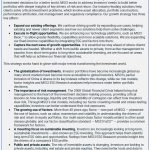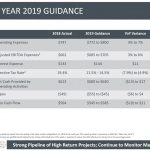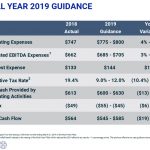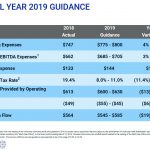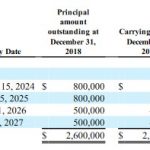MSCI Inc. (MSCI) is the leader in providing global benchmarks to institutional investors.
It released its Q2 and YTD2019 results and updated FY2020 guidance on August 1, 2019.
Investors would be wise to refer to my August 9th ‘Howard Marks’ related article when considering whether to invest in MSCI at current levels.
Summary
- MSCI is the leader in providing global benchmarks to institutional investors.
- It has greatly benefited from the shift to passive investments and should continue to benefit as long as investors favor ETFs and other low cost index-based products over actively managed funds.
- It has a recognized brand and high switching costs present a steep challenge for competitors.
- MSCI derives more than 10% of its revenue from BlackRock. The current terms of MSCI’s ETF licenses are scheduled to expire in March 2020 and both parties are in advanced constructive discussions around a new long-term agreement.
- MSCI is even more richly valued than when I wrote my May 5th article.
Introduction
At the time of this MSCI Inc (MSCI) article, shares were trading at $226.93 and based on my analysis I was of the opinion that shares were richly valued. On the basis of my analysis and outlook on MSCI’s share price over the next few months I decided to initiate a Bear Call Spread on the expectation that the share price would pull back prior to the September 20th option contract expiry date.
My profit on this trade will be maximized if MSCI closes at or below $210/share and although shares closed at ~$224 on August 9th there is a little over a month to go before expiry and MSCI’s share price can be volatile. In fact, MSCI’s share price was ~$209 on August 5th.
If Mr. Market behaves the way I think it will between now and the September 20th option expiry date I think MSCI’s share price will pullback from the current $224.05.
The Future Of Investing
The Business Overview section of my May 5th article provides a high level overview of the business and the risk factors.
Not everyone reading this article may be familiar with MSCI, and therefore, I provide the following additional information about this company.
MSCI has 3 key pillars to its growth strategy which dovetails with the transformation of the investment world.
Source: MSCI – Quarterly Update – August 1, 2019
At its 2019 Investor Day, MSCI’s management shared with the investment community that it sees ample opportunities and growth potential for its current ‘run the business’ activities. It does, however, see significant growth potential for the ‘change the business’ activities; management shared the following 3 examples of ‘change the business’ activities.
- new high-growth areas of content creation such as environmental, social and governance (‘ESG’) and factors for both equity or fixed income and fixed income analytics and indices and real estate and other private asset classes.
- new client areas such as wealth management in key regions such as Asia, and new index licensing opportunities such as futures and options, listed on exchanges and derivatives issued by banks and broker dealers.
- new distribution channels and a new content enabling technology that allows for those distribution channels to prosper.
In addition, over the last several months MSCI has had several notable developments that reinforces its conviction around the ‘change the business’ investment areas.
In the first half of FY2019, for example, 40% of inflows into all U.S. exposure equity ETFs went into ETFs linked to MSCI Indices; globally there was a total of $14B of inflows into ETFs linked to MSCI’s Factor indices.
By leveraging its cutting-edge fixed income factor model, MSCI rolled out a new tier multi-asset class Factor framework which allows clients to seamlessly analyze their portfolios from the highest level of factors and to drill down to the most granular factors across any asset class.
MSCI also expects to introduce later this year a series of new corporate credit curves which enhances its fixed income and multi-asset class capabilities.
MSCI has identified derivatives as a relatively new growth area that could be substantial over time. Historically, the market for listed index-linked derivatives was almost entirely focused on single market, single currency derivatives where the trading hours and currencies of all the underlying securities were the same.
Trading technology has progressed over the decade and MSCI’s exchange partners have increasingly had success at educating the global trading community on how to trade in listed futures based on MSCI’s indexes, which are mostly multimarket and multicurrency in nature.
In order to help accelerate the growth of this opportunity, MSCI has created a team which is focused heavily on licensing MSCI’s indexes for listed and over-the-counter (OTC) derivatives. This team is broadening and deepening relationships with exchanges and broker-dealers who are generating a pipeline of new index-linked derivative product launches. MSCI is also seeing its exchange partners invest in marketing, sales coverage, sell-side partnerships and market maker programs which aim to foster liquidity formation.
Within MSCI’s broker-dealer client base, new opportunities are arising to serve retail and institutional clients with structured products like index-linked notes, swaps and options of which most are based on MSCI’s market cap indexes.
Further details on how MSCI plans to transform in a transforming industry were presented at MSCI’s February 28, 2019 Investor Day.
Q2 2019 Results
MSCI’s Q2 Earnings Release can be found here and its accompanying presentation can be found here.
MSCI stands to benefit from the long-term trend of data management, advanced analytical models and sophisticated technology that are becoming increasingly critical to the investment industry.
MSCI reported double-digit organic subscription run rate growth which was driven by strength across regions and major client segments. The Americas were up 8%, Europe, the Middle East and Africa (EMEA) was up 11%, and Asia was up 13%.
Asset owners, asset managers and broker-dealers, which collectively comprise more than 80% of MSCI subscription run rate, saw organic subscription run rate growth of 9%, 10% and 10%, respectively.
On the Q2 conference call management provided a brief update on its iShares relationship. The current terms of MSCI’s ETF licenses are scheduled to expire in March 2020 subject to relatively short-term evergreen renewal provisions. MSCI is now engaged in advance constructive discussions with BlackRock (iShares) around a new long-term agreement.
It is MSCI’s objective to continue to expand its successful BlackRock partnership by balancing the price volume mix in order to maximize long-term revenue growth. MSCI anticipates that within the next few months an agreement should have been finalized at which time MSCI will provide more details.
FY2019 Guidance
The following guidance was provided when Q4 and FY2018 results were released January 31, 2019.
Guidance presented in the Q1 2019 Earnings Presentation on May 2, 2019 was amended slightly.
Guidance presented in the August 1, 2019 Q2 2019 Earnings Presentation is much the same as that presented on May 2nd with the only change being a more favorable effective tax rate.
MSCI expects its full year effective tax rate to be between 8% – 11%. This includes the income tax benefit of ~11% which is related to the divestiture of certain multiyear performance stock units (PSU) in Q1; this is excluded from adjusted EPS. Excluding this benefit, MSCI expects its effective tax rate used to calculate adjusted EPS to be 19% – 22%.
Credit Ratings
Moody’s downgraded MSCI’s unsecured long-term debt to Ba2 from Ba1 in August 2015. This is the middle tier of the non-investment grade (speculative) category.
S&P Global Ratings has rated MSCI BB+ since April 2012. This is the top tier of the non-investment grade (speculative) category.
These ratings are lower than what I like to see from companies in which I take a position. My current exposure to MSCI in the form of a Bear Call Spread is extremely modest so this weak credit rating was a non-issue when I placed my trade.
Looking at the following schedule of long-term debt we can see that MSCI’s risk is somewhat elevated given the interest rates accorded to its long-term debt.
MSCI: FY2018 10-K (page 118 of 256)
Valuation
In my May 5th article I looked at MSCI’s diluted PE ratio for the 2011 – 2018 timeframe and noticed very wide swings in MSCI’s PE on an annual basis.
At the time of my May 5th article, MSCI was trading at ~$210 and high, low and mean adjusted diluted EPS projections were $6.34, $5.95, and $6.16. This gave us high, low and mean forward adjusted PE levels of ~33.1, ~35.3, and ~34.
MSCI is now trading at $224.05 and high, low and mean adjusted diluted EPS projections are $6.39, $6.12, and $6.29. This gives us high, low and mean forward adjusted PE levels of ~35.1, ~36.6, and ~35.6.
While earnings guidance has increased subsequent to my previous article, the jump in MSCI’s share price now results in an even less attractive valuation.
Dividend and Dividend Yield
MSCI’s dividend history in recent years has been impressive with a CAGR of 30% for the last 5 years.
On July 30, 2019, MSCI’s Board declared a cash dividend of $0.68/share for Q3 representing an increase of 17.2% from $0.58/share in Q2; the Q3 dividend is payable on August 30th to shareholders of record as of the close of trading on August 16th.
While MSCI’s dividend growth has been impressive, some investors will pass on MSCI as a potential investment due to its ~1.2% forward dividend yield ($2.72/ ~$224).
MSCI’s dividend should continue to be adequately covered by earnings and Free Cash Flow.
Shares Outstanding
In my previous article I wrote:
‘The diluted weighted average shares outstanding used in computing EPS has declined from 116,706 million in FY2014 to 89,701 million in FY2018. In Q1 2019, the weighted average diluted shares outstanding declined 7.5% to 85.6 million, compared to 92.6 million in Q1 2018. In Q1 2019, a total of 0.7 million shares were repurchased at an average price of $147.97/share for a total value of $102.1 million. A total of $0.7B remains on the outstanding share repurchase authorization as of April 30, 2019. Total shares outstanding as of March 31, 2019 was 84.7 million.’
While MSCI returned more than $1B through share repurchases since the beginning of 2018, it repurchased no shares in Q2 as it is company policy to repurchase opportunistically.
The fact MSCI repurchased no shares of late suggests to me that MSCI is likely of the opinion its shares are richly valued.
Final Thoughts
Although MSCI’s credit ratings are lower than what I like to see from an investment I like MSCI’s long-term growth prospects and would be prepared to initiate a position. The risk I see in initiating an investment in MSCI at current levels, however, is that I view shares as being richly valued. In my opinion, investing in a non-investment grade risk rated company that has a forward adjusted PE in the mid 30s is not prudent.
The risk is further magnified in that someone is behaving irrationally and ‘tweets’ random thoughts that throw the markets in a tizzy.
In my opinion, this is not the time to be investing in MSCI. As much as its long-term prospects appear to be promising I think it will be difficult to make money if a position is initiated when shares are trading at the current valuation.
I would consider initiating a position in MSCI if its share price were to retrace to at least the $165 range. Naturally, any decision to invest in MSCI would need to be weighed relative to other investment opportunities.
I wish you much success on your journey to financial freedom.
Thanks for reading!
Note: I sincerely appreciate the time you took to read this article. Please send any feedback, corrections, or questions to charles@financialfreedomisajourney.com.
Disclaimer: I have no knowledge of your individual circumstances and am not providing individualized advice or recommendations. I encourage you not to make any investment decision without conducting your own research and due diligence. You should also consult your financial advisor about your specific situation.
Disclosure: I hold a bearish option position in MSCI in the form of a Bear Call Spread which expires September 20th.
I wrote this article myself and it expresses my own opinions. I am not receiving compensation for it and have no business relationship with any company whose stock is mentioned in this article.



